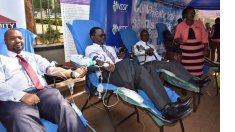Feedback/Comments from Our Readers
|
 Comments, questions and feedback is always welcome. Comments, questions and feedback is always welcome.
|
|
Global Health Rounds - February 26
|
Hi everyone, we are supporting a couple of medical students on Monday about their Fudan elective. To give some insight to the program. Cheers,
Next upcoming Rounds on March 12th will be will be on Social Justice with our guest speaker Dr. Ayelet Kuper from the University of Toronto.
We're always looking for new speakers and ideas for topics for Global Health Rounds for this coming up academic year. If you have speakers or topics, please contact Cheryl Knowles at GHFoMD@ualberta.ca |
|
Doctors in Uganda warn 'crisis level' blood shortage is putting lives at risk
|
 Uganda Uganda is grappling with a critical shortage of blood that is affecting services and putting patients’ lives at risk.
The health ministry’s blood bank facility in the capital, Kampala, which stores and distributes supplies to hospitals, is practically empty. It has just 150 units of blood remaining, not enough to meet requirements on an average day in the city. Nationally, Uganda needs at least 340,000 units of safe blood annually, but usually only collects 200,000 a year.
A six-day countrywide blood collection drive was launched by the ministry on Monday.
The Uganda Medical Association, an umbrella organisation of doctors in public health facilities, said the shortage was “almost [at] crisis level”, resulting in the cancellation of hospital operations and prioritisation of cases.
Mukuzi Muhereza, the association’s secretary-general, said: “It’s a big, nationwide problem. It’s emergency level, a crisis. Nearly every hospital is crying [out] for blood. Nearly every regional referral hospital is complaining about blood.” An extra 7 billion shillings (£1.4m) is needed to procure donor and testing kits, and to fund blood donation drives, to get the service back on track for the next six months.
To read more about this article go to https://www.theguardian.com
|
|
China confirms first ever human case of H7N4 bird flu
|
 A woman from eastern China has been confirmed as the first ever human case of H7N4 bird flu, according to Chinese authorities.
Officials in Hong Kong have advised citizens to avoid wet markets, live poultry markets or farms if travelling to the mainland over the week-long lunar new year holiday which starts on Thursday.
The 68-year-old patient from Jiangsu province, who has since recovered, developed symptoms on 25 December, was admitted to hospital for treatment on 1 January and was released on 22 January.
“She had contact with live poultry before the onset of symptoms,” Hong Kong’s centre for health protection (CHP) said in an alert on Wednesday evening. “According to a report from the Chinese centre for disease control and prevention, upon analysis, the genes of the virus were determined to be of avian origin.”
A CHP spokesperson said the diagnosis had been confirmed earlier this week and added: “Travellers to the mainland or other affected areas must avoid visiting wet markets, live poultry markets or farms. They should be alert to the presence of backyard poultry when visiting relatives and friends.
“They should also avoid purchasing live or freshly slaughtered poultry, and avoid touching poultry/birds or their droppings. They should strictly observe personal and hand hygiene when visiting any place with live poultry.
|
|
Death toll mounts in Central Darfur ‘watery diarrhoea’ outbreak
|
In Nierteti in Central Darfur, the death toll from ‘acute watery diarrhoea’ – suspected of being cholera – has amounted to nine, while the infection cases have risen to more than 100. Yesterday activists in voluntary work reported to Radio Dabanga from Nierteti that four people died of the disease while being transported from neighbouring villages to the hospital.
An activist from the hospital told Radio Dabanga that the medical isolation centre allocated to receive the cases was full, while others are still searching for a place. He said that the isolation centre has about 65 suspected cases of cholera. Volunteers in voluntary work have appealed to the Federal Ministry of Health and State to urgently act.
|
|
Malaria parasites killed quickly by blue dye
|
 According to the World Health Organization, malaria is responsible for approximately 445,000 deaths every year. That number may be due to drop, however, as scientists have found that a human-safe blue dye kills parasites in patients' bloodstreams within two days – that's faster than has ever been possible before.
When a person is bitten by a malaria-carrying mosquito, one-celled malaria parasites enter their red blood cells and split into male and female sex cell parasites known as gametocytes. Should another mosquito then bite that person, they suck up those gametocytes, which mate in their stomach. This results in a batch of new malaria parasites that make their way to the mosquito's salivary glands, where they can infect another person whom the mosquito bites.
Ordinarily, malaria is treated with combination therapies based on the drug artemisinin. Unfortunately, however, even after the treatment ends, the gametocytes can remain in the patient's bloodstream for up to several weeks. This means that any mosquitoes which bite them in that time can still spread the disease to another person.
That's where the methylene blue dye comes in.
To read more about this article go to https://newatlas.com/
|
|
One in six children 'affected by conflict' - Save the Children
|
 Children are at more risk from armed conflict now than at any other time in the last 20 years, the charity says. Its new analysis found more than 357 million children were living in a conflict zone - an increase of 75% from the 200 million of 1995.
Syria, Afghanistan and Somalia were ranked as the most dangerous places for children. In general, children in the Middle East were most likely to live in a conflict zone, where two in every five lived within 50km of the site of a battle or other fatal attack. Africa was ranked second, at one in five.
Just under half of at-risk children - some 165 million - were classified as living in "high-intensity" conflict zones. Those children are at risk of all six of what the United Nations calls "grave violations":
- killing and maiming
- recruitment and use of children
- sexual violence
- abduction
- attacks on schools and hospitals
- denial of humanitarian access
Save the Children used UN and other research data in its report, but criticised "huge gaps" in the scope of data recorded by forces at war with one another. Despite its concerns, it said there was still a 300% increase in the number of children killed and maimed since 2010, according to a record of incidents verified by the UN.
|
|
|
|
Save the Dates of Local Events!
|
Social Justice Rounds
Guest Speaker:
Dr. Ayelet Kuper From the University of Toronto
March 12, 2018
12:00 - 1:00
Room: 1-190 ECHA
============================
Social Justice Workshop
Facilitated by: Dr. Ayelet Kuper, University of Toronto
March 13, 2018
Time: 15:00 - 18:00
Location: 4-036 ECHA
===========================
Annual Rich Man Poor Man Dinner Event 2018
April 7, 2018
Time: 6:00 pm to 9:30 pm
Please note if you have any resaleable items for the SIHA silent auction, please email me at GHFoMD@ualberta.ca. Thanks for those who donate. |
|
Conferences, Symposiums & Lectures
|
Save this link to your favorites as I update it daily will all events, symposiums, etc., just click here.
==========================
2018 CUGH Conference
March 16 - 18, 2018
New York Hilton Midtown,
=========================
Global Health & Innovation Conference
April 14-15, 2018
Yale University
New Haven, CT
|
|
Call for Abstracts/Submissions
|
Global Health & Innovation Conference at Yale on
April 14-15, 2018
is calling for abstracts.
|
|
Newsletter & Special Journal Editions
|
|
|